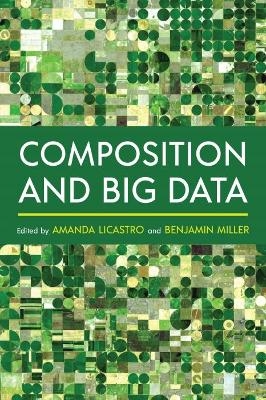
Composition and Big Data
Seiten
2021
University of Pittsburgh Press (Verlag)
978-0-8229-4674-8 (ISBN)
University of Pittsburgh Press (Verlag)
978-0-8229-4674-8 (ISBN)
This book interprets and implements the drive toward data in diverse ways.
Everything is data. And as large-scale aggregation and computational analysis of data become more common and manageable, it becomes more important to rhetoric and composition. It is increasingly possible to examine thousands of documents and peer-review comments, labor-hours, and citation networks in composition courses and beyond. Composition and Big Data brings together a range of scholars, teachers, and administrators working with big-data methods and datasets to kickstart a collective reckoning with the role that algorithmic and computational approaches can, or should, play in research and teaching in the field. From ethical reflections to database design, from corpus linguistics to quantitative autoethnography, these chapters interpret and implement the drive toward data in diverse ways. Their work takes place in various contexts, including programmatic assessment, first-year pedagogy, stylistics, and learning transfer across the curriculum.
Everything is data. And as large-scale aggregation and computational analysis of data become more common and manageable, it becomes more important to rhetoric and composition. It is increasingly possible to examine thousands of documents and peer-review comments, labor-hours, and citation networks in composition courses and beyond. Composition and Big Data brings together a range of scholars, teachers, and administrators working with big-data methods and datasets to kickstart a collective reckoning with the role that algorithmic and computational approaches can, or should, play in research and teaching in the field. From ethical reflections to database design, from corpus linguistics to quantitative autoethnography, these chapters interpret and implement the drive toward data in diverse ways. Their work takes place in various contexts, including programmatic assessment, first-year pedagogy, stylistics, and learning transfer across the curriculum.
Amanda Licastro is the emerging & digital literacy instructional designer at the University of Pennsylvania. Her research explores the intersection of technology and writing, including book history, dystopian literature, and digital humanities, with a focus on multimodal composition and extended reality. Benjamin Miller is assistant professor of composition in the English Department at the University of Pittsburgh, focusing on digital research and pedagogy. He is the author of the poetry collection Without Compass.
| Erscheinungsdatum | 01.11.2021 |
|---|---|
| Reihe/Serie | Composition, Literacy, and Culture |
| Zusatzinfo | 75 b&w illustrations |
| Verlagsort | Pittsburgh PA |
| Sprache | englisch |
| Maße | 152 x 229 mm |
| Themenwelt | Geisteswissenschaften ► Sprach- / Literaturwissenschaft ► Sprachwissenschaft |
| Informatik ► Datenbanken ► Data Warehouse / Data Mining | |
| ISBN-10 | 0-8229-4674-2 / 0822946742 |
| ISBN-13 | 978-0-8229-4674-8 / 9780822946748 |
| Zustand | Neuware |
| Haben Sie eine Frage zum Produkt? |
Mehr entdecken
aus dem Bereich
aus dem Bereich
Datenanalyse für Künstliche Intelligenz
Buch | Softcover (2024)
De Gruyter Oldenbourg (Verlag)
74,95 €
Auswertung von Daten mit pandas, NumPy und IPython
Buch | Softcover (2023)
O'Reilly (Verlag)
44,90 €


